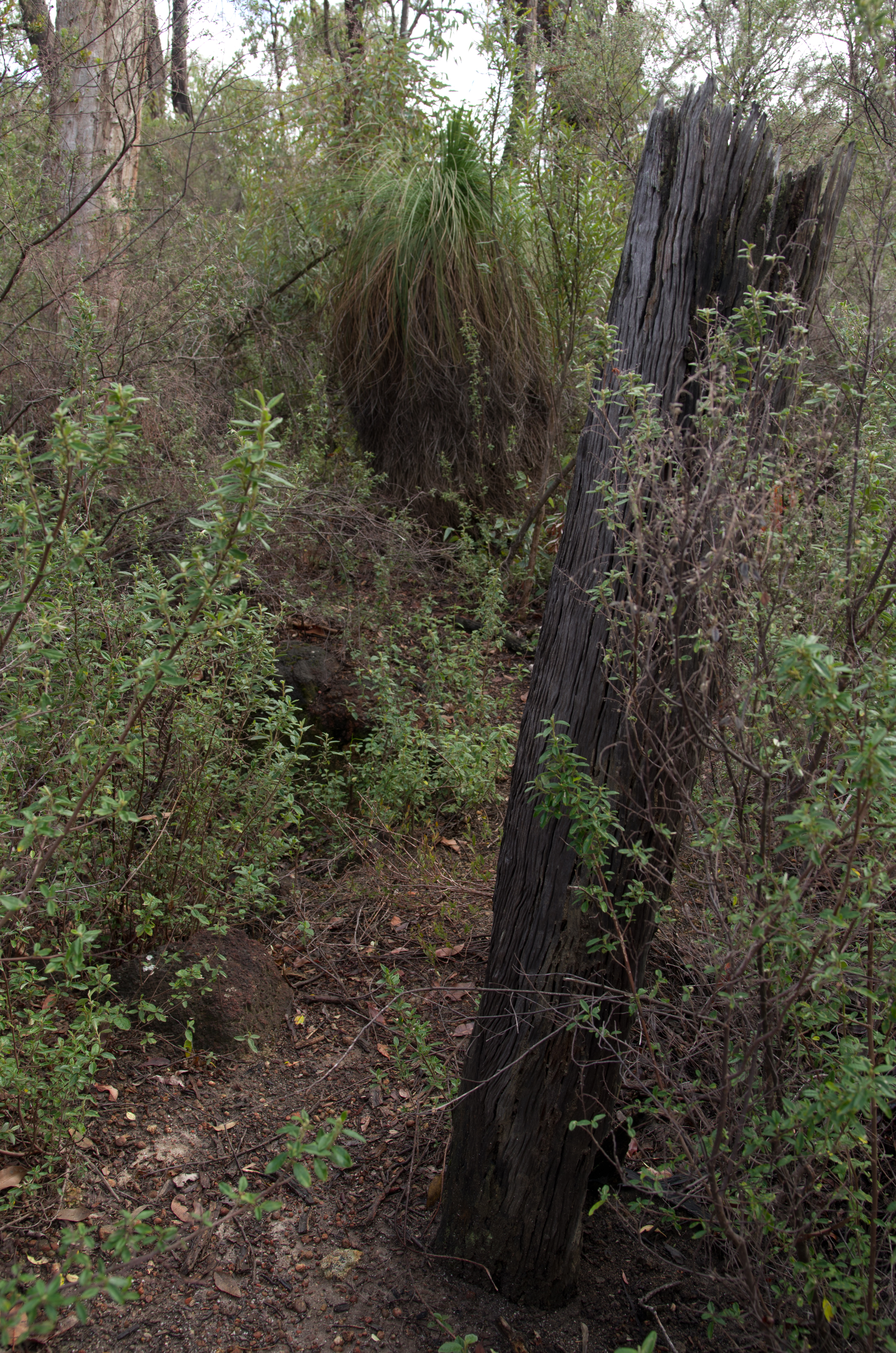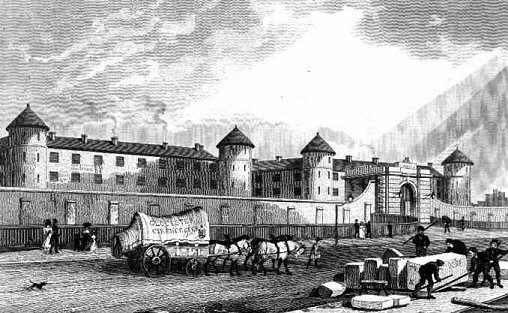|
Joseph Johns
Joseph Johns ( February 1826 – 13 August 1900), better known as Moondyne Joe, was an English convict and Western Australia's best-known bushranger. Born into poor and relatively difficult circumstances, he became something of a petty criminal robber with a strong sense of self-determination. He is remembered as a person who had escaped multiple times from prison. Biography Child Hood Born in Cornwall, England, around 1826 and raised as Protestant. He was baptised in the Parish Church at Wendron, married at Johnston Memorial Congregational church at Fremantle, and buried in the Anglican section of Fremantle Cemetery. Despite claims that he was Roman Catholic, there is no evidence for this and would be incredibly unusual in Cornwall. He was the third of three children of blacksmith Thomas Johns (1799–1833) and his wife Mary Bolitho (1804–1860). Joe was a tall man with black hair and hazel-coloured eyes, and it is likely that he contracted smallpox in his youth as ... [...More Info...] [...Related Items...] OR: [Wikipedia] [Google] [Baidu] |
Cornwall
Cornwall (; kw, Kernow ) is a historic county and ceremonial county in South West England. It is recognised as one of the Celtic nations, and is the homeland of the Cornish people. Cornwall is bordered to the north and west by the Atlantic Ocean, to the south by the English Channel, and to the east by the county of Devon, with the River Tamar forming the border between them. Cornwall forms the westernmost part of the South West Peninsula of the island of Great Britain. The southwesternmost point is Land's End and the southernmost Lizard Point. Cornwall has a population of and an area of . The county has been administered since 2009 by the unitary authority, Cornwall Council. The ceremonial county of Cornwall also includes the Isles of Scilly, which are administered separately. The administrative centre of Cornwall is Truro, its only city. Cornwall was formerly a Brythonic kingdom and subsequently a royal duchy. It is the cultural and ethnic origin of the Cornish dias ... [...More Info...] [...Related Items...] OR: [Wikipedia] [Google] [Baidu] |
Iron Ore
Iron ores are rocks and minerals from which metallic iron can be economically extracted. The ores are usually rich in iron oxides and vary in color from dark grey, bright yellow, or deep purple to rusty red. The iron is usually found in the form of magnetite (, 72.4% Fe), hematite (, 69.9% Fe), goethite (, 62.9% Fe), limonite (, 55% Fe) or siderite (, 48.2% Fe). Ores containing very high quantities of hematite or magnetite (greater than about 60% iron) are known as "natural ore" or "direct shipping ore", meaning they can be fed directly into iron-making blast furnaces. Iron ore is the raw material used to make pig iron, which is one of the main raw materials to make steel—98% of the mined iron ore is used to make steel. In 2011 the ''Financial Times'' quoted Christopher LaFemina, mining analyst at Barclays Capital, saying that iron ore is "more integral to the global economy than any other commodity, except perhaps oil". Sources Metallic iron is virtually unknown on ... [...More Info...] [...Related Items...] OR: [Wikipedia] [Google] [Baidu] |
Millbank Prison
Millbank Prison or Millbank Penitentiary was a prison in Millbank, Westminster, London, originally constructed as the National Penitentiary, and which for part of its history served as a holding facility for convicted prisoners before they were transported to Australia. It was opened in 1816 and closed in 1890. Construction The site at Millbank was originally purchased in 1799 from the Marquess of Salisbury for £12,000 by the philosopher Jeremy Bentham, acting on behalf of the Crown, for the erection of his proposed panopticon prison as Britain's new National Penitentiary. After various changes in circumstance, the Panopticon plan was abandoned in 1812. Proposals for the National Penitentiary continued, however, and were given a legislative basis in the Penitentiary House, etc. Act of 1812 (52 Geo. 3 c. 44). An architectural competition for a new prison building on the Millbank site attracted 43 entrants: the winning design was that of William Williams, drawing master at the ... [...More Info...] [...Related Items...] OR: [Wikipedia] [Google] [Baidu] |
William Erle
William is a male given name of Germanic origin.Hanks, Hardcastle and Hodges, ''Oxford Dictionary of First Names'', Oxford University Press, 2nd edition, , p. 276. It became very popular in the English language after the Norman conquest of England in 1066,All Things William"Meaning & Origin of the Name"/ref> and remained so throughout the Middle Ages and into the modern era. It is sometimes abbreviated "Wm." Shortened familiar versions in English include Will, Wills, Willy, Willie, Bill, and Billy. A common Irish form is Liam. Scottish diminutives include Wull, Willie or Wullie (as in Oor Wullie or the play ''Douglas''). Female forms are Willa, Willemina, Wilma and Wilhelmina. Etymology William is related to the given name ''Wilhelm'' (cf. Proto-Germanic ᚹᛁᛚᛃᚨᚺᛖᛚᛗᚨᛉ, ''*Wiljahelmaz'' > German ''Wilhelm'' and Old Norse ᚢᛁᛚᛋᛅᚼᛅᛚᛘᛅᛋ, ''Vilhjálmr''). By regular sound changes, the native, inherited English form of the name should b ... [...More Info...] [...Related Items...] OR: [Wikipedia] [Google] [Baidu] |
Plea
In legal terms, a plea is simply an answer to a claim made by someone in a criminal case under common law using the adversarial system. Colloquially, a plea has come to mean the assertion by a defendant at arraignment, or otherwise in response to a criminal charge, whether that person pleaded or pled guilty, not guilty, '' nolo contendere'' (a.k.a. no contest), no case to answer (in the United Kingdom), or Alford plea (in the United States). The concept of the plea is one of the significant differences between criminal procedure under common law and procedure under the civil law system. Under common law, a defendant who pleads guilty is automatically convicted, and the remainder of the trial is used to determine the sentence. This produces a system known as plea bargaining, in which defendants may plead guilty in exchange for a more lenient punishment. In civil law jurisdictions, a confession by the defendant is treated like any other piece of evidence. A full confession does ... [...More Info...] [...Related Items...] OR: [Wikipedia] [Google] [Baidu] |
Burglary
Burglary, also called breaking and entering and sometimes housebreaking, is the act of entering a building or other areas without permission, with the intention of committing a criminal offence. Usually that offence is theft, robbery or murder, but most jurisdictions include others within the ambit of burglary. To commit burglary is to ''burgle'', a term back-formed from the word ''burglar'', or to ''burglarize''. Etymology Sir Edward Coke (1552–1634) explains at the start of Chapter 14 in the third part of ''Institutes of the Lawes of England'' (pub. 1644), that the word ''Burglar'' ("''or the person that committeth burglary''"), is derived from the words ''burgh'' and ''laron'', meaning ''house-thieves''. A note indicates he relies on the ''Brooke's case'' for this definition. According to one textbook, the etymology originates from Anglo-Saxon or Old English, one of the Germanic languages. (Perhaps paraphrasing Sir Edward Coke:) "The word ''burglar'' comes from the two Ge ... [...More Info...] [...Related Items...] OR: [Wikipedia] [Google] [Baidu] |
Assizes
The courts of assize, or assizes (), were periodic courts held around England and Wales until 1972, when together with the quarter sessions they were abolished by the Courts Act 1971 and replaced by a single permanent Crown Court. The assizes exercised both civil and criminal jurisdiction, though most of their work was on the criminal side. The assizes heard the most serious cases, which were committed to it by the quarter sessions (local county courts held four times per year), while the more minor offences were dealt with summarily by justices of the peace in petty sessions (also known as magistrates' courts). The word ''assize'' refers to the sittings or sessions (Old French ''assises'') of the judges, known as "justices of assize", who were judges who travelled across the seven circuits of England and Wales on commissions of "oyer and terminer", setting up court and summoning juries at the various assize towns. Etymology Middle English < |
Brecon
Brecon (; cy, Aberhonddu; ), archaically known as Brecknock, is a market town in Powys, mid Wales. In 1841, it had a population of 5,701. The population in 2001 was 7,901, increasing to 8,250 at the 2011 census. Historically it was the county town of Brecknockshire (Breconshire); although its role as such was eclipsed with the formation of the County of Powys, it remains an important local centre. Brecon is the third-largest town in Powys, after Newtown and Ystradgynlais. It lies north of the Brecon Beacons mountain range, but is just within the Brecon Beacons National Park. History Early history The Welsh name, Aberhonddu, means "mouth of the Honddu". It is derived from the River Honddu, which meets the River Usk near the town centre, a short distance away from the River Tarell which enters the Usk a few hundred metres upstream. After the Dark Ages the original Welsh name of the kingdom in whose territory Brecon stands was (in modern orthography) "Brycheiniog", whi ... [...More Info...] [...Related Items...] OR: [Wikipedia] [Google] [Baidu] |
Arraignment
Arraignment is a formal reading of a criminal charging document in the presence of the defendant, to inform them of the charges against them. In response to arraignment, the accused is expected to enter a plea. Acceptable pleas vary among jurisdictions, but they generally include "guilty", "not guilty", and the peremptory pleas, or pleas in bar, setting out reasons why a trial cannot proceed. Pleas of '' nolo contendere'' ("no contest") and the Alford plea are allowed in some circumstances. Australia In Australia, arraignment is the first of 11 stages in a criminal trial, and involves the clerk of the court reading out the indictment. The judge will testify during the indictment process. Canada In every province in Canada, except British Columbia, defendants are arraigned on the day of their trial. In British Columbia, arraignment takes place in one of the first few court appearances by the defendant or their lawyer. The defendant is asked whether they plead guilty or no ... [...More Info...] [...Related Items...] OR: [Wikipedia] [Google] [Baidu] |
The Welshman
''Y Cymro – The Welshman'' is a named passenger train of the Great Western Railway running between and . ''The Welshman'' was a named passenger train of the London, Midland and Scottish Railway that ran from London Euston Station to Holyhead with portions for Llandudno, Pwllheli and Porthmadog Porthmadog (; ), originally Portmadoc until 1974 and locally as "Port", is a Welsh coastal town and community in the Eifionydd area of Gwynedd and the historic county of Caernarfonshire. It lies east of Criccieth, south-west of Blaenau Ffest .... References Named passenger trains of the London, Midland and Scottish Railway Named passenger trains of British Rail {{UK-rail-transport-stub ... [...More Info...] [...Related Items...] OR: [Wikipedia] [Google] [Baidu] |
Theft
Theft is the act of taking another person's property or services without that person's permission or consent with the intent to deprive the rightful owner of it. The word ''theft'' is also used as a synonym or informal shorthand term for some crimes against property, such as larceny, robbery, embezzlement, extortion, blackmail, or receiving stolen property. In some jurisdictions, ''theft'' is considered to be synonymous with ''larceny'', while in others, ''theft'' is defined more narrowly. Someone who carries out an act of theft may be described as a "thief" ( : thieves). ''Theft'' is the name of a statutory offence in California, Canada, England and Wales, Hong Kong, Northern Ireland, the Republic of Ireland, and the Australian states of South Australia Theft (and receiving). and Victoria. Theft. Elements The '' actus reus'' of theft is usually defined as an unauthorized taking, keeping, or using of another's property which must be accompanied by a '' mens rea'' of dish ... [...More Info...] [...Related Items...] OR: [Wikipedia] [Google] [Baidu] |






